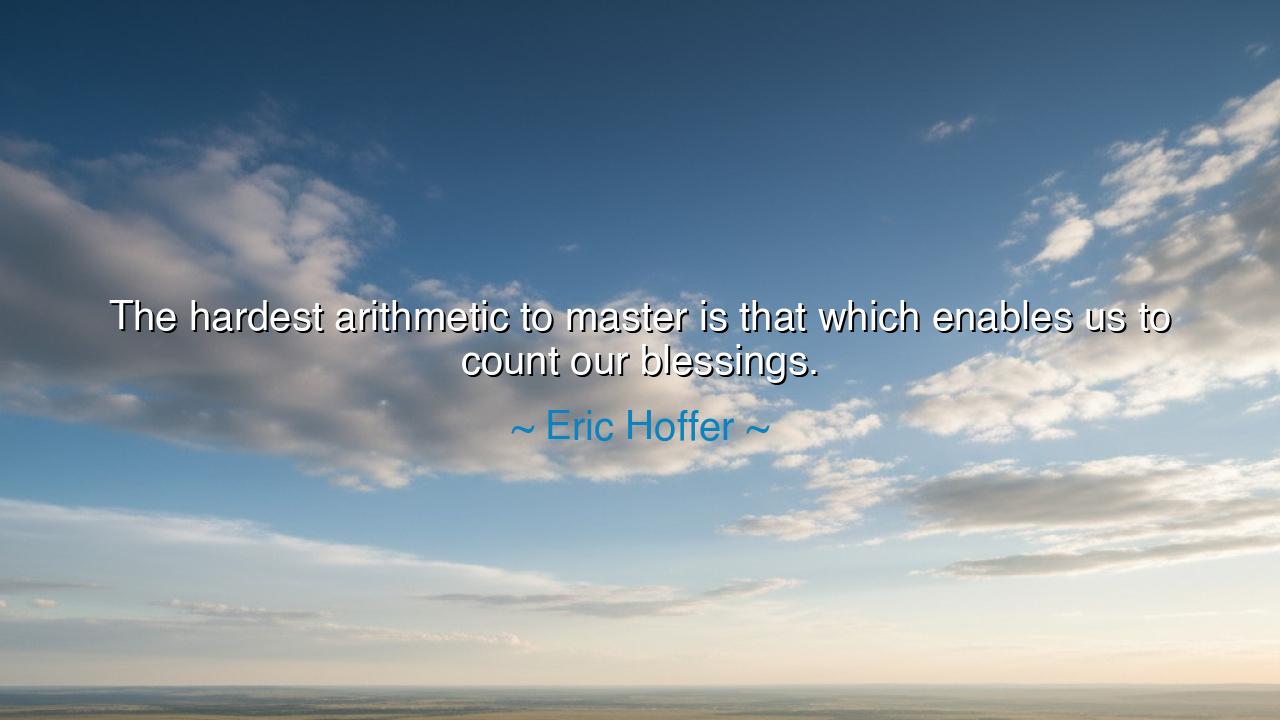
The hardest arithmetic to master is that which enables us to






Hear, O seeker of wisdom, the words of Eric Hoffer, who declared: “The hardest arithmetic to master is that which enables us to count our blessings.” At first, the saying strikes the ear with a playful twist, for arithmetic is the science of numbers, and what could be simpler than counting? Yet Hoffer, a man of deep thought and sharp observation, unveils a profound truth: the human heart struggles more to recognize its gifts than to reckon its debts. To measure loss is easy, for pain cries out; but to measure blessing is difficult, for blessings are often silent, woven into the fabric of daily life until they are overlooked.
The ancients understood this paradox. They taught that man can number the coins in his purse, yet fail to number the mercies of the heavens. He can calculate the hours lost in toil, but not the moments of joy that heal him. This is why Cicero named gratitude the parent of virtues, for without it, no soul can live in harmony. Hoffer echoes this wisdom in modern words: to count blessings requires discipline greater than calculation, for it demands the eyes of the spirit, not merely the mind.
Why is this arithmetic so hard? Because the heart leans naturally toward hunger and want. Men see what they lack more clearly than what they hold. The merchant knows each coin he has yet to earn, but forgets the wealth already in his hand. The weary soul laments the thorn, but overlooks the rose. Thus, though life offers daily gifts—health, breath, companionship, the rising sun—few pause to number them. We mistake the ordinary for nothing, when in truth the ordinary is everything.
Consider the story of Helen Keller, who was struck blind and deaf as a child. For many, such a fate would seem the theft of all blessings. Yet through perseverance and the devotion of her teacher, she learned to see through touch and to hear through the silence of her mind. In her writings, she often spoke of gratitude for the smallest things: the warmth of the sun, the fragrance of a flower, the touch of a friend’s hand. To her, blessings were not scarce, but abundant. She mastered the hardest arithmetic, seeing riches where others would see only poverty. Her life is a testimony that even in darkness, the soul can count blessings beyond measure.
The truth is this: the one who fails to count blessings lives in poverty, no matter how rich; the one who counts them diligently lives in abundance, no matter how poor. The heart trained in gratitude transforms its world. A crust of bread becomes a feast, a single candle becomes a festival of light, and the companionship of one faithful friend becomes a kingdom. This is the alchemy of thanksgiving, the hidden power that turns little into much.
The lesson for you, child of time, is clear: practice the higher arithmetic. Do not let your soul dwell only on what is absent, but on what is present. Train your heart daily to number your mercies. Begin with the simplest: breath in your lungs, strength in your body, the presence of the earth beneath your feet. Then add to them the unseen: the lessons of hardship, the growth from failure, the love you have given and received. Soon you will find your list of blessings longer than any tally of sorrows.
Practical steps are these: each morning, count aloud three blessings before you begin your labor. Each evening, record in writing what good you received that day, however small. When envy or complaint rises, counter it by naming a hidden gift that envy has blinded you to. And when you face trial, ask not only what you have lost, but also what remains, and what strength you have gained. This is the arithmetic Hoffer speaks of, the hardest yet the most rewarding.
Therefore, remember his teaching: “The hardest arithmetic to master is that which enables us to count our blessings.” Numbers on a page may enrich the hand, but numbers of gratitude enrich the soul. Master this counting, and you will walk the earth not as one impoverished, but as one crowned with abundance, every day a treasure, every breath a hymn of thanks.






AAdministratorAdministrator
Welcome, honored guests. Please leave a comment, we will respond soon